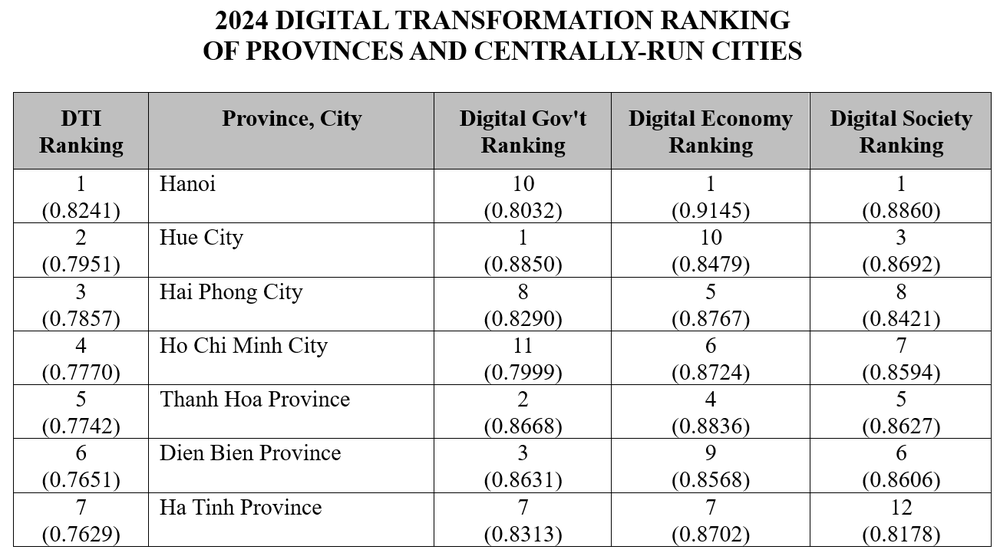
This is the results of the 2024 Digital Transformation Index (DTI), unveiled by the Ministry of Science and Technology on October 21 at an event celebrating National Digital Transformation Day 2025.
Deputy Director Nguyen Phu Tien of the National Digital Transformation Agency explained that the Ministry of Science and Technology has been implementing the DTI since 2020.
It’s designed to assess digital transformation levels across three tiers: ministerial, provincial, and national. The DTI, he noted, serves as a crucial tool for tracking progress, gauging effectiveness, and steering policies to propel digital transformation nationwide.
The national DTI is a composite of 12 indicators grouped into three main pillars of Digital Government (400 points), Digital Economy (300 points), and Digital Society (300 points), for a 1,000-point total.
The provincial DTI mirrors this structure. A significant portion of the provincial score is based on a set of common foundational indexes like digital awareness, digital institutions, digital infrastructure, digital workforce, and cybersecurity, which are weighed alongside performance indicators in digital government, economy, and society.
The ministerial DTI is tailored, featuring 6 main indicators and 31 component indicators (also totaling 1,000 points) to reflect the unique digital transformation challenges and duties of each ministry.
At the local level, the 2024 DTI was calculated using two distinct assessment groups: one for the 63 provinces and cities (pre-merger) and another for the 34 provinces and cities (post-merger). This dual approach, as it’s understood, not only reflects the recent administrative resizing but also ensures a more accurate, practical monitoring of digital transformation efforts.
In this ranking, HCMC led the pack in the 63-province group but placed fourth (after Hanoi, Hue City, and Hai Phong City) in the new 34-entity group. This result clearly illustrates the comprehensive development and expanded scale of the “megacity” following its administrative merger. HCMC reportedly excelled in the criteria for digital awareness and digital institutions, while also securing high marks in digital society activities, digital infrastructure, and the digital economy.
Deputy Prime Minister Nguyen Chi Dung made a firm request that the popularization and use of digital identity must be accelerated. He stated a clear goal. By 2026, 100 percent of adults must possess a digital identity, a payment account, and an electronic identification account. Furthermore, he mandated that public databases must be shared based on controlled principles, framing data as the “lifeblood of innovation and digital transformation.”
HCMC’s ability to maintain its DTI leadership in 2024, despite a new administrative model, is a testament to its “relentless efforts.” This reflects its strategy of using science, technology, innovation, and digital transformation as “primary engines for growth.” The city is focusing on strategic tech like AI and chips, while also pushing administrative reform. Despite infrastructure challenges, HCMC continues to roll out solutions, aiming to become an international-standard Innovation Center by 2030.

According to Permanent Deputy Minister of Science and Technology Vu Hai Quan, as Vietnam enters the 2026-2030 period, its digital transformation efforts will pivot toward “deep and substantive” efficiency. The focus, he said, will be on converting digital achievements into tangible economic growth, productivity, and national competitiveness.
The digital world moves every second. “If we are slow, we will fall behind,” he warned. “Therefore, digital transformation must accelerate to be faster in institutional reform, strategy implementation, tech application, and most critically, changing mindsets.” But he added that it’s not just about speed; rather, digital transformation must be more effective, measured by specific results and the value delivered to citizens, businesses, and the economy.
Deputy Prime Minister Nguyen Chi Dung emphasized that since 2022, Vietnam has accelerated its digital transformation, which has progressively permeated daily life. He noted that state management and administrative procedures have been strongly digitized, with 80 percent of ministries and localities now operating on shared data platforms. Digital government and smart city models have taken shape.
He also highlighted that the Government has been pushing the implementation of Project 06, which centers on developing the national population database and electronic identification. Alongside this, public services like residency registration, birth certificate issuance, health insurance, and transportation have all been digitized.
This, he explained, helps people “live, study, and work in a digital environment.” As a result, the national digital infrastructure has been solidified, and the digital economy now reportedly accounts for nearly 20 percent of GDP.
He urged central ministries, sectors, and localities to continue strengthening their institutional frameworks. He called for the urgent real-world application of laws related to science, technology, and digital transformation, and the timely, synchronous, and complete issuance of all necessary guiding decrees and circulars.
He also called for a focus of resources to invest in digital infrastructure, stressing the need to pay attention to both hard infrastructure (like data centers and telecommunications networks) and soft infrastructure (like digital platforms and national databases).
























